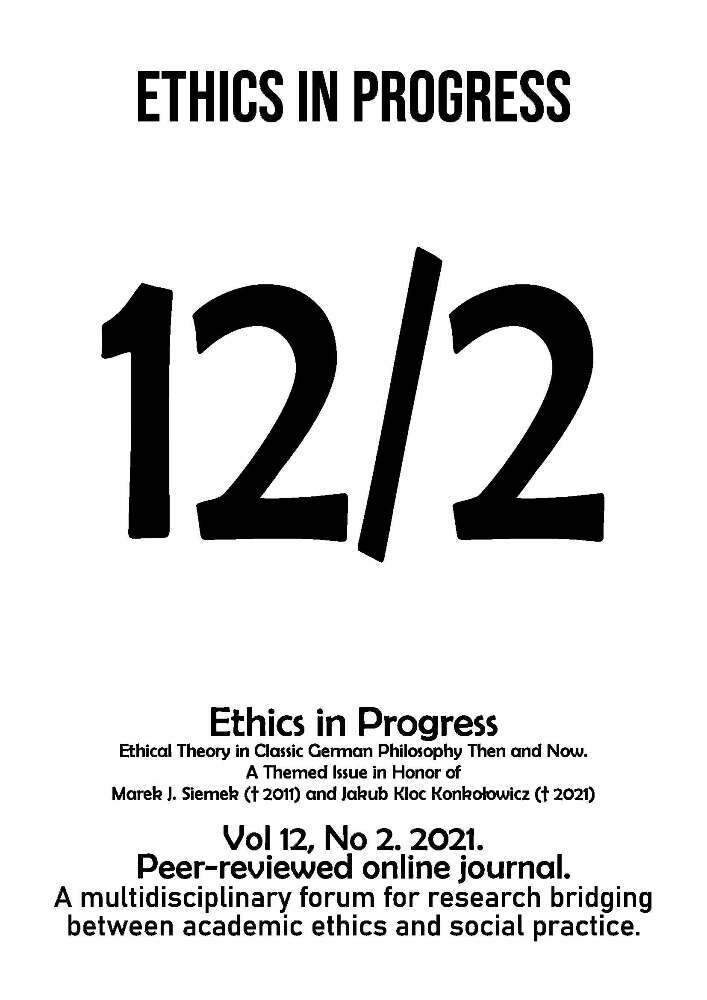Abstract
In this paper I will focus on education as the core function of reason in Kant and Fichte. The notion of reason carries an intrinsic tendency to universality, which is difficult to be reconciled with its local (cultural, historical, anthropological) background and actualisation. I believe that the stress on the importance of learning, which can be seen in the works of both Kant and Fichte, might provide useful clues to approaching the relation between universality and particularity. I will start by focusing on Kant’s narration on the genealogy of human reason in the Conjectural Beginning of Human History, and then move on to the critical writings and selected lectures in order to focus on the role of human dignity and ethical education for the moral appraisal and the practice of virtue. Later, I will consider Fichte’s lectures on the Vocation of the Scholar, the Vocation of Man and The Characteristics of the Present Age, which are crucial to understanding the social, ethical and political role of the scholar. For Fichte, education is the best instrument to eradicate selfishness, regarded as a historical phenomenon which can lead a nation to ruin. I will then provide some conclusions concerning the two accounts and their implications.
References
Bonnet C. 1755. L’Essay. De Psychologie, ou Considérations. Sur les opérations. De l’âme, sur l’habitude, et sur l’éducation auxquelles on a ajouté des principes philosophiques sur la cause première et sur son effet. London: La Société Typographique.
Dimić Z. 2003. “The Problem of Education in Fichte’s Philosophy,” Facta Universitatis, Series: Philosophy, Sociology and Psychology 2(10):777–788.
Fichte J. G. 1922. Addresses to the German Nation, trans. R. Foy Jones & G. H. Turnbull. Harvard: Open Court Publishing Company,
Fichte J. G. 1962. “De recto praeceptorum poeseos et rhetorices usu,” in R. Lauth & H. Jacob (Eds.), Johann Gottlieb Fichte Gesamtausgabe der Bayerischen Akademie der Wissenschaften (GA/II, 1, pp. 5–29). Stuttgart: Frommann-Holzboog.
Fichte J. G. 1977. “Characteristics of the Present Age,” in D. N. Robinson (Ed.), Significant Contributions to the History of Psychology 1750-1920 (pp. 1–290). Washington, D.C.: University Publications of America.
Fichte J. G. 1988. “Some Lectures Concerning the Scholar’s Vocation,” in D. Breazeale (Ed.), J. G. Fichte: Early philosophical writings, trans. D. Breazeale. Ithaca: Cornell University Press.
Fichte J. G. 1994. IWL = Introductions to the Wissenschaftslehre and Other Writings (1797-1800), ed. and trans. by D. Breazeale. Indianapolis: Hackette.
Forst R. 2012. The Right to Justification: Elements of a Constructivist Theory of Justice, trans. J. Flynn. New York: Columbia University Press.
Gerhardt V. 1990. „Selbstbestimmung,“ in Europäische Enzyklopädie zu Philosophie und Wissenschaften. Hamburg: Sandkühler.
Herman B. 1985. “The Practice of Moral Judgment,” The Journal of Philosophy 82(8):414–436.
Herman B. 1996. “Pluralism and the Community of Moral Judgment,” in D. Heyd (Ed.), Toleration: An Elusive Virtue (pp. 60–80). Princeton: Princeton University Press.
Herman B. 1998. “Training to Autonomy: Kant and the Question of Moral Education,” in A. Oksenberg Rorty (Ed.), Philosophers on Education. London – New York: Routledge.
Hankovszky T. 2018. “Philosophy of Education in Early Fichte,” Educational Philosophy and Theory 50(6/7):631–639.
Hörner W., Drinck B., & Jobst S. 2008. Bildung, Erziehung, Sozialisation. Opladen: Barbara Budrich.
James D. 2014. “Fichte’s Republicanism: Education, Philosophy and the Bonds of Reason,” History of Political Thought 35(3):485–518.
Kant I. 1900–. Gesammelte Schriften. Berlin: Akademie-Ausgabe (AA).
Kant I. 1996a. Practical Philosophy, trans. and ed. by M. J. Gregor. Cambridge: Cambridge University Press.
Kant I. 1996b. Religion and Rational Theology, trans. and ed. by A. W. Wood & G. di Giovanni. Cambridge: Cambridge University Press.
Kant I. 1998. Critique of Pure Reason, trans. and ed. by P. Guyer & A. Wood. Cambridge: Cambridge University Press.
Kant I. 2000. Critique of the Power of Judgement, trans. and ed. by P. Guyer. Cambridge: Cambridge University Press.
Kant I. 2007. Anthropology, History, and Education, trans. and ed. by G. Zöller & R. Louden. Cambridge: Cambridge University Press.
Kivelä A. 2012. “From Immanuel Kant to Johann Gottlieb Fichte - Concept of Education and German Idealism,” in P. Siljander, A. Kivelä, & A. Sutinen (Eds.), Theories of Bildung and Growth. Connections and Controversies between Continental Educational Thinking and American Pragmatism (pp. 59–86). Rotterdam: Sense Publishers.
Kloc-Konkołowicz J. 2006. „Der Kantische Spinozismus. Die Gegenwart Spinozas in der Sittenlehre Fichtes“, in Ch. Asmuth &. W. Metz (Eds.), Die Sittenlehre J. G. Fichtes 1798-1812. Fichte Studien, vol. 27.
Louden R. 2000. Kant‘s Impure Ethics. New York: Oxford University Press.
Pareyson L. 1976. Fichte. Il sistema della libertà. Milano: Mursia.
Rousseau J.-J. 2002. The Social Contract and the First and Second Discourses. New Haven, CT: Yale University Press.
Seidel H. 1997. J. G. Fichte. Hamburg: Junius Verlag.
Sensen O. 2011. Kant on Human Dignity. Berlin: Walter de Gruyter.
Spalding J. J. 1997. Die Bestimmung des Menschen. Die Erstausgabe 1748 und die letzte Auflage von 1794, ed. by W. E. Müller. Waltrop: Spenner.
Weisskopf T. 1970. Immanuel Kant und die Pädagogik. Zürich: EVZ Verlag.
Willaschek M. 2018. Kant on the Sources of Metaphysics. The Dialectic of Pure Reason. Cambridge: Cambridge University Press.
Winkler M. 1991. „Immanuel Kant über Pädagogik – eine Verführung,“ Vierteljahresschrift für Wissenschaftliche Pädagogik 67:241–261.





